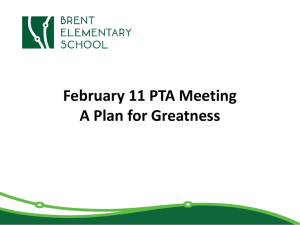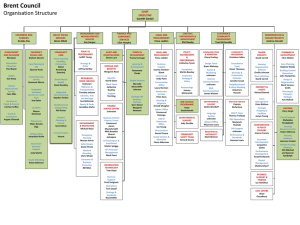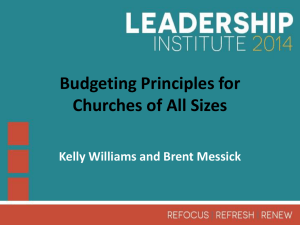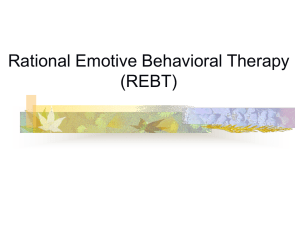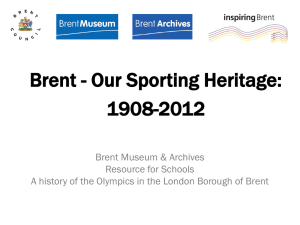January 14 PTA Meeting Full Plenary Deck
advertisement
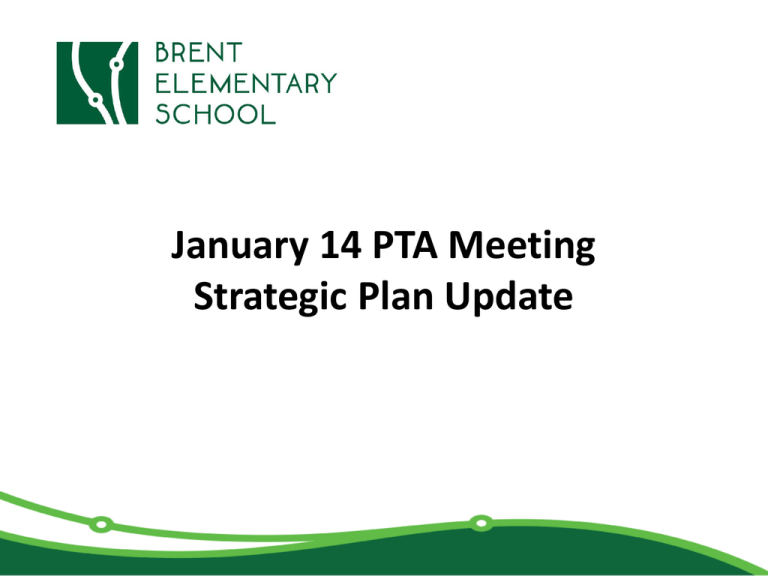
January 14 PTA Meeting Strategic Plan Update Some Thanks… Steering Committee: – Staff: Amy Harding-Wright, Whitney Paxson and Sarah Werstuik – Parents: Nazanin Ash, Ben Feldman and Paul Sherman WG Chairs – – – – WG1: Michael Crawford WG2: Bridgette Garchek WG3: Michael Jefferson WG4: Amanda Catanzano 2 Why This Strategic Plan Process? Why? How? What? Why- We believe that every student deserves and will receive the very best educational experience while at Brent. 3 What Is the Goal? • Goal of the process is to articulate a clear set of longer term goals for the school, and to identify the corresponding actions, resources and priorities to get us there. • 80% of parents last spring indicated strong support for Brent. This process is trying to determine what can be done to get us to 100%! • Essentially, I want to take this school from very good to really great! 4 Some Final Thoughts… • “We start[ed] this journey from the right place, a high quality school with an engaged school community that is passionate about making Brent, and the Brent experience the best it can be.” -Letter from Beginning of Year • “Greatness is not a function of circumstance. Greatness, it turns out, is largely a matter of conscious choice, and discipline.” -Jim Collins, Good to Great: Why Some Companies Make the Leap...and Others Don't 5 Working Group 1 Strengthening Brent’s Foundational Approaches Working Group 1 Scope • Examine the effectiveness (strengths and weaknesses) of Brent’s Foundational Approaches: Responsive Classroom Reading and Writing Workshop Math Investigations Reggio-Inspired Early Childhood • Consider best practices for closing gaps in implementation, communication, and conceptualization 7 Working Group 1 Findings • Brent’s Foundational Approaches compliment each other with a focus on social and academic skills, communication, and student choice • Tradeoffs for any approach are real, but choices have been made thoughtfully and explicitly • Brent’s Foundational Approaches are designed to work and mostly do work for the majority of Brent students • Teachers feel they have the training and resources to implement the approaches, but not always the time to give each approach what it needs • Many perceived gaps are a result of poor communication strategies, such as front-loading information at Back-toSchool Night and lack of information on the Brent 8 website Working Group 1 Recommendations • Professional Development and Training Goal: increase % of teachers attending trainings aligned to foundational approaches, support teachers to share their experiences Prioritize trainings for teachers who demonstrate challenges or lack of confidence in implementation within an approach • Time Use “Learning Communities” to maximize time for receiving professional development and sharing best practices Consider ways to extend or reorganize the day to create more time for implementing core and extra/supplemental instruction • Communication Raise parent knowledge of foundations – at an initial and deeper levels Provide multiple avenues for all “types” of parents to receive information about the approaches (such as: website, 1-pagers, videos, workshops) 9 Working Group 2 Advancing the Potential Of Every Student WG#2 Objective and Scope Objective: To be a highly effective, inclusive school • Maximize the potential of every student through differentiated instruction delivered largely in the classroom – Differentiation is for students at, below and above grade level – Pull-outs/specialists predominant use is to support students with the greatest challenges Scope: The working group was asked to 1. 2. 3. 4. 5. Understand Brent’s current approaches to differentiated instruction Evaluate Brent’s current performance/results Identify strengths, gaps, and areas for improvement Examine best practices, including those at comparable schools Develop options/recommendations, short- medium- and longterm actions, and resource needs 11 WG#2 Findings • Guiding Principles: Brent is an Inclusive School • Brent Strengths – – – – • High quality teachers and staff Strong approaches to assess and identify needs for intervention (Brent knows its students very well) A curricular approach that allows for differentiation Steady academic progress: Brent’s school index score has and continues to rise yearly Challenges – Behavior: No staffing resources are dedicated to responding to acute behavioral challenges/crises; this causes strain on students in need of behavioral support and classroom teachers, and affects classroom dynamics – Intervention: Brent’s support system for intervention is limited, especially when compared to high performing schools – Enrichment: No formal program exists to identify and serve advanced students; no staffing resources are dedicated to enrichment – Resources: Brent differentiated learning is significantly under resourced versus comparison schools • Performance Results – These resource challenges have made it difficult for Brent to turn plans into action and maximize its assets; though we have made steady progress with a fraction of the resources of other schools, 23% of Brent students are below grade level in reading and 24% are below grade level in math, compared to an average of 13% in reading and 11% in math at our comparison schools, with similar demographics 12 WG#2 Recommendations • Behavior – Hire a behavior tech immediately; seek DCPS resources to build a behavior management team • Intervention – Expand Brent’s intervention support team and system: put a high-quality instructional aide in every classroom • Enrichment – Pursue full participation in DCPS’ School-Wide Enrichment Model (SEM) – Use flexible staffing resource (aides in every classroom) to increase individualized attention in the classroom and maximize differentiation approaches in Brent’s curriculum • Resources – Reprioritize existing resources to address differentiation gaps – Pursue aggressive strategies for additional resources to support differentiated learning 13 Working Group 3 Strengthening Brent’s Specials Working Group 3 Scope • Evaluate options to strengthen Brent’s flagship “specials” program, including: Broadening art instruction Increasing physical education time Strengthen Language Program Identify strengths and foundations to build on, gaps and areas for improvement Develop recommendations to increase frequency, curricular and destination school integration 15 Working Group 3 Findings • Brent’s Specials teachers have unique, longitudinal perspective on Brent students (know every student, work with them each year) that should be fully utilized. • Brent Specials Teachers time is fully booked—but significant portion of time is spent performing other roles (cafeteria duty, recess, RTI). • Lack of formal and informal communication channels with parents limit interaction, common understanding and partnering opportunities. 16 WG 3 Recommendations • Communication and integration Find mechanisms to benefit from Specials teachers longitudinal exposure to students and seize opportunities for curricular alignment Improve visibility of specials via presentations at general PTA meetings, articles in Tues News, and back to school night open classrooms. • Time Reduce the amount of time Specials teachers spend on RTI, lunch and recess duty to create time for additional specials blocks Consider moving to 6-day week to reduce “Monday problem” Reorganize instructional blocks to create more time for specials • Programmatic Consider shifting World Language to a 2nd-5th Grade program with 90 minutes of instruction per week, consistent with the FLES model and a less intensive PS – 1st grade program. Increase priority given to PE class for use of multipurpose room, playground and make use of outdoor space at X-park. 17 Working Group 4 Becoming a Strong Field Experience School WG4: Becoming a Strong Field Experience School • WG4’s Key Question: How can Brent structure a field experience program and develop partnerships to strengthen its field experience? • WG4’s Key Goal: Strengthen the overall Brent student experience by designing a field experience program that promotes student hands-on/minds-on learning through outside of the classroom field experiences and through bringing field experiences into Brent classrooms. 19 Brent Field Experience: A Good News Story • Parents and teachers, in large numbers, value field trips and field experience – 80% of teachers say field trips are important or very important to learning and 93% enjoy taking them – 86% of parents say field experience is important or very important and believe trips are well-planned and organized – 80% of parents say field experience are a source of valuable learning – Parents are involved -- over a third of parents have chaperoned between 6-15 trips 20 From Good to Great • CONSISTENCY: How can Brent optimize the use of field experience in all classrooms across all grades? • CONTINUITY: How can field experience be a thread that weaves through a student’s entire time at Brent? • COMMUNICATION: How can field experience goals and curricular links be best communicated to families? How can chaperones be better prepared to supervise and engage students during trips? How can parents be prepared 21 to engage students after trips? Draft Recommendations General Recommendation: Rebrand to “ A Field Experience School” Consistency Recommendations: • Establish formal partnerships with museums/community institutions • Designate a “Field Experience” Coordinator, Grade-level Lead, and Parent (in addition to room parent) • Online database of destinations and parent connections Continuity Recommendations: • “Field Trip Journey” journal • Leverage Institutional partnerships • Regular field trip updates at teacher staff meetings. Communication Recommendations: • Between Principal Young and teachers • Emails to parents to encourage field trip follow up • Web-based calendar with field trips updated regularly across grades 22


